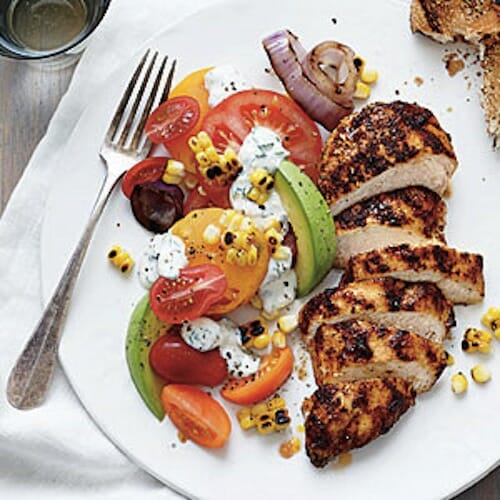Grilling has long been considered one of the healthiest ways to cook. Yet over the past several years, much has been written about the potential health hazards lurking in barbecued foods. Indeed, research has found that the fat in foods on a grill — meat and poultry, in particular — drip into the flames, flare up, and create a smokey, charred surface that may contain carcinogens.
Does that mean you have to give up your beloved barbecue?
Absolutely not.
Grilling continues to be, as far as I’m concerned, one of the best ways to infuse flavor into food and minimize added fats, especially in summer when we all want to be outdoors. But a few pointers can really minimize the risks. Below you’ll find a handy guide from Cooking Light to help you get smart when it comes to grilling healthfully:
1. Marinate Your Meat
Marinating meat helps to reduce carcinogens. Kansas State University researchers marinated steaks in three different mixtures of oil, vinegar, and herbs and spices. After grilling, carcinogens in the marinated steaks were cut by 57 to 88 percent. Dozens of studies confirm the effect. The reason it works is not so clear: The marinade may create a protective barrier between the meat’s proteins and the heat of the grill. Or the antioxidants in the marinade may combat the carcinogens head-on.
2. Clean Your Grill
Keep your grill clean by scrubbing with a brush before and after grilling food. Scrubbing keeps the buildup of carcinogens left on the grill grates to a minimum and makes your food taste so much better.
3. Ban Flare Ups
When you cook a fatty piece of meat, the fat that drips onto the flames creates smoke which may contain the much talked about carcinogens. If you grill lean meats, poultry, and fish, you’ll have less fat which means less smoke, which means less of the bad stuff.
4. Beware of Burnt
A bit of char is unavoidable (and it tastes good), but incinerated meat will contain more cancer-causing compounds. Don’t get the coals superhot and then plop fatty meat directly on the grill. The blackened parts of meat may also contain carcinogens, so remove all charred or burned portions of food before eating.
5. Work the Grill
Depending on your grill, it may not be the same temperature throughout-some have hot spots while others have cooler areas. Work the whole surface of the grill to keep certain areas from flaming more than others. If you do have a flare up, just move the food to a cooler part of the grill until the fire dies down
6. Size Matters
Size matters when it comes to grilling meat. Cube or slice meat into smaller portions to speed up the cook time or choose a quick-cooking option like shrimp or fish.
7. The Shorter the Cook Time, The Better
The faster foods are cooked, the less likely they’ll develop dangerous charring. Don’t cook meat past its goal temperature: 165 degrees for ground poultry; 160 degrees for ground red meats or mixtures and fresh pork; or 145 degrees for red meat steaks or chops.
8. Consider Other Foods
Go beyond meat and try grilling some unexpected foods like peaches, asparagus, or even bread. Throw fruits and veggies on the grill for a tasty, nutrient-rich side or dessert or give pizza a try for a quick dinner.
Now that you know how to grill, the question becomes what to grill. This Grilled Chicken with Tomato Avocado Salad is definitely on my summer “to do” list.
What do you like to throw on the barbie?
